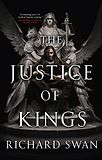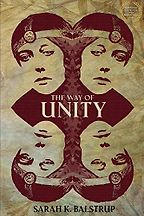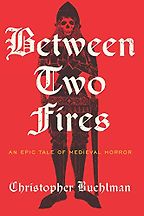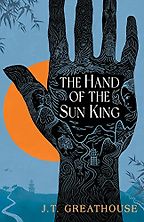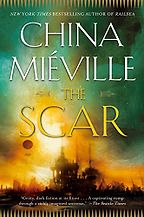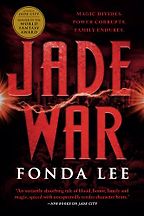High fantasy books tell epic stories in secondary worlds. The Lord of the Rings is of course the giant of the genre, but it still tops bestseller lists today, with authors like Brandon Sanderson and George R R Martin. Why do you think we love to read these often-harrowing tales?
One of the things I love about fantasy is it’s such a wonderful way of holding a mirror up to modern society. I think it’s a really effective genre for taking socio-political problems or issues that we’re facing in the modern world, and filtering them through the lens of sociologically and technologically less developed societies that we invent. There are all sorts of contrivances that we can add into that world building, to really focus and drill down on certain issues and make quite stark and compelling points. A good specific example of this is the way N K Jemisin examined themes of racial injustice and climate change in her Broken Earth series; a broader example is the way fantasy authors are increasingly making their worlds queernormative and removing homo- and transphobia as antagonistic forces from their books entirely. You think, “Well, if a medieval-esque society can get this right, or they can do a certain thing in a certain way, what’s stopping us from doing it?”.
There’s certainly some interesting politics in your first choice. Could you introduce us to The Way of Unity by Sarah Balstrup?
The Way of Unity is a really interesting book. Sarah is an Australian writer. She read my first book a little while ago, and left a nice review on Goodreads for it. I looked on her profile, and noticed that she was an author as well – and she was a religious studies scholar as well, an academic. I really enjoy religious themes in my books. Religion is almost always a theme or an element in fantasy novels, as in real life – and fantasy mirrors real life.
It turned out to be one of my favourite books of this year. It was brilliant. It’s from the perspective of a young woman called Sybilla, the daughter of a husband-and-wife pair of rulers called the Skalens. There are seven sets of Skalens around this seven-nation land of Velspar, which forms a religious confederation. And going around the land of Velspar is a psychic priesthood called the Intercessors, who take away what they call ‘red thoughts’: any criminal thoughts you have, or just anything that’s kind-of bad. They physically extract it from your brain, and they make you all nice and chilled out and sanguine. They worship these animals – in my head it’s a bit like a pterodactyl, but it probably isn’t, it’s probably like a massive eagle – that’s the god-father, Kshidol. Then they have Siatka, who’s the god-mother, and a sea serpent. They’ve taken these two real creatures and woven them into the story of their religion.
That’s the premise. Then, in about the first ten pages, the Intercessors burn down Sybilla’s house with her family inside and kill all of them. Sybilla manages to escape. Her father had been quietly planning to purge the Intercessors – which is probably why they got murdered, to be fair – so Sybilla takes up the mantle, and she leads a pogrom of the Intercessors, and they’re all butchered.
So this psychic priesthood evaporates. This all happens in the first twenty or thirty pages of the book. You don’t see this often in fantasy, because often what we’re concerned with is the big battle – especially in a series, you’ll have the antagonist and the good guys fighting and sparring and clashing and, eventually, you have the big denouement at the end in book three: the big climax. Then you always wonder, what happens after that? What happens after the big battle? Presumably, there’s a massive administrative burden that follows in the wake of it. What I really loved about this book was that we start at the end – they have this pogrom of all the Intercessors, it’s all very gruesome, and then suddenly they’re all gone. And what do we do now? Sybilla inherits this nation, which has hitherto had a very present, very visible priesthood, often close to members of the society or the village, who have performed acts of intercession and led them in worship. And people have gleefully slaughtered them. Everybody starts to think, “Oh… maybe this wasn’t such a good idea. Actually, there are aspects of it I miss.” And of course, it’s all completely forbidden now on pain of death.
It’s such a brilliant examination of a post-religious society in which they’ve had a bloodbath, and now have all the festering pockets of resentment. The author is brilliant, she’s thought of everything. The trade suffers – because they’ve killed off the priests, but they’ve also killed off all the people who still believed in the religion as well – so it’s a hugely decimated population. Trade is down because all the farm labourers have been killed, because they wouldn’t renounce. It’s a really skilfully considered novel. It managed the topic of religion in such a clever and nuanced way, and also made aspects of the religion very real and tangible. It wasn’t all just based on faith. There was a very real element to it, obviously fantastical, but the Intercessors could literally read and extract thoughts – so it was both about that, and about the power of belief.
Your next choice also features religion, but the battle lines are now not just between priesthood and secular power, but between angels and demons. Could you tell us about Between Two Fires by Christopher Buehlman?
Chris Buehlman is an American author. He’s very, very well known for a book called The Blacktongue Thief, which did phenomenally well. Everybody knows him for that book, and he’s writing a prequel to that, I think, as we speak. I don’t quite remember how I stumbled across Between Two Fires. It was his second book – well before The Blacktongue Thief, which was his sixth – and at the time I believe it didn’t land very well, it didn’t hit the market in quite the right way. The rights reverted to him, and he self-published it. And I picked it up because it had, again, religious themes.
It’s about a man called Thomas. He’s wounded at the Battle of Crecy in 1346, part of the Hundred Years’ War. And he gets an arrow in the face – in his jaw. During the course of his convalescence, he’s divested of all his land holdings by a rogue lord. So he resorts to a life of brigandage and is pillaging the countryside, when he comes across this young girl – I think she’s probably about twelve or thirteen. The band of brigands, they’re going to do awful things to her, so he kills all of them and saves her; and she says, “I need to get to Avignon” – where the Pope was based at that time.
So he ends up taking her across France. At this time, France is in the throes of bubonic plague. There’s a really good book which has a chapter on the bubonic plague, The Time Traveller’s Guide to Medieval England by Ian Mortimer, who’s a fellow of the Royal Historical Society. He talks about how it killed three-fifths of the population of Europe, and takes two or three paragraphs to sit back and say, “Actually imagine what a profound horror that would have been. Your friends are dying, your family’s dying, and you have absolutely no idea why, because the medical science just wasn’t there.” One of the things he talked about was how incredibly evangelical people would have been in 14th-century England – they would have been extremely, extremely devout. A lot of them would have believed very strongly and tangibly that the bubonic plague was divine judgment, and it would have been utterly terrifying for them.
“One of the things I love about fantasy is it’s such a wonderful way of holding a mirror up to modern society”
So Between Two Fires takes place against this dismal backdrop. We’re moving through France, and it’s obviously all very frightening and there are corpses everywhere. I didn’t really realise this when I was first reading the book, but it’s actually a horror novel as well – a medieval fantasy horror. The first inkling we have of this is when they reach a river, and the locals say, “There’s a demon in the river. If you sort it out, we’ll reward you.” And I was like, “Oh! There is literally a monster!” – and it just gets worse and worse from there. What Chris does really well is very biblical monsters and demons: they have things like eyes on their chests and hands for feet and so on, like the creatures on an illuminated medieval manuscript. He’s been quite faithful to that aesthetic.
They pick up a priest who is gay and closeted, so he’s fighting his own ordeal – as a consequence, he’s a drunk – and the three of them traipse across plague-ravaged France. At the same time, it’s the War in Heaven—literally—so there’s this big Divine Comedy or Dr Faustus vibe to it.
The horror is both subtle and very, very overt. For example, there’s a bit where everybody hides at night because all the church statues have come to life, and they’re wandering the streets murdering people. The statues have their sceptres and they’re smashing the doors in and killing people. It’s a very, very frightening book! At the end, Thomas literally goes to hell for a stint, and that’s also very well done and very horrible.
It’s a brilliant, brilliant book. And I just hadn’t heard of it. I was utterly enthralled; it was one of the best books I’ve ever read. I think it’s finding its audience now, and very quietly it’s becoming much more popular.
In this book, we’ve got a battle that’s literally inhuman, but any high politics can feel very remote. What’s Buehlman doing to give us a sense of personal connection?
You get different types of fantasy novel. Obviously, you get different types of every sort of novel. But I think within fantasy you tend to get either the big sweeping plot-driven books – for example, to come back to The Lord of the Rings, there’s very little internality. You never get a few paragraphs of Gimli ruminating on something. It’s all very much: Gimli and Legolas did this, then they went there, then they did this, and then Aragorn said this to this bloke. It’s just a sequence of events.
It’s a bit reductive to say that, but if we compare it to a lot of modern fantasy, we now see a lot more internality. We’re interested in the characters, what they’re thinking and feeling, the dynamics between them. Ultimately, I think that’s the engine that drives all fiction and makes it interesting.
I think what Chris, and a lot of these books that I read now, do very well is that character internality. Everyone is given their own head, they think and reflect. And it’s not just about, “Oh, it’s cold, so therefore I’m miserable.” It’s also very existential reflection. I think that’s what makes a lot of modern fantasy and a lot of modern fiction more generally much more compelling, and I think the genre is moving in the right direction in that respect.
We return to human politics with your next choice, featuring empire and its dissidents. Could you tell us about The Hand of the Sun King by J T Greathouse?
I’m on a discord with a bunch of other authors and Jeremy is one of them. It’s always a bit nerve-wracking when you read a book by someone that you know, because there’s a risk that it’s bad! But luckily, it was brilliant.
The Hand of the Sun King is about Wen Alder, a young man caught between two worlds. His grandmother comes from a pagan black magic clan in the hills, and his uncle led a rebellion against the empire; so he comes from this rebellious province, and there are lots of occupying forces trying to keep it all on the level. At the same time, he is tutored in the imperial arts. His father is a merchant, an aspirational upper-middle-class merchant, in a very socially stratified society. He hires a tutor for Wen, for what is essentially a college entrance exam – if you can afford it and you’re intelligent enough, you take this test in logic and reasoning and mathematics and philosophy and poetry. It’s a bit like PPE at Oxford, that kind of idea – the medieval Chinese equivalent. And if you pass it, depending how well you do, it puts you in a certain stratum within the imperial civil service. The civil servants have magical powers. They’re like very powerful mages, essentially.
So, on the one hand, Wen’s grandmother teaches him this black magic, a kind of rustic sorcery, that’s very much a secret. And on the other hand, he’s being tutored in imperial arts, and he takes the exam and does extremely well, and gets admitted. He’s the first from this rebellious province to be admitted, so there are lots of people who are quite leery about it – “These are the barbarians, and you’re going to let one of them in?”
So he’s very, very powerful – and he basically then screws it all up. One of the things I really liked was that Jeremy made Alder very fallible. He acts exactly how you’d expect an adolescent boy to act – an adolescent boy who’s imbued with an incredible amount of magical power as well. Long story short, he ends up leading a rebellion. It’s like – I leave you alone for five minutes, and you’re leading a rebellion? It’s a character study as much as anything else. A lot of fantasy novels of the ’80s and ’90s were focused on the hero and the hero’s journey, and you would get these Mary-Sue characters who are perfect. They were immediately good at everything, very virtuous, very morally black and white, and there was no problem that they couldn’t solve. Terry Goodkind’s Sword of Truth is an excellent example of that. But Alder is just slouching from one catastrophe to the next and inevitably making everything worse. He wants to do good, but he has a teenage boy’s arrogance as well. If he’s angry, he’ll think, “I’m feeling righteous, I’m going to kill this person”; and he’ll kill that person, and not think about the butterfly effect of that death, how it closes doors, how it angers people.
I read the sequel this year, The Garden of Empire, which was also very good. It broadened out – massive elemental gods come out of the woodwork. It’s a brilliant series.
Both empire and religious power feature in your own work, as well as the judiciary, borrowing from your legal background. How did you develop convincing politics for The Justice of Kings?
When I started writing The Justice of Kings I had the kernel of an idea. I was a litigator in London and I just had this thought one day: what if there were fantasy lawyers? I had read Imperium by Robert Harris, which is brilliant, about the life of Cicero. It covers Cicero when he was still a lawyer in ancient Rome – solving a case, orating, doing a bit of oration in court. And then as the trilogy progresses, the stakes become a bit more empire-ending – or rather republic-ending.
Initially, I had this idea of ‘legomancy’, using magical words and arguments in court. That never made the cut, but the seed was planted. The Justice of Kings is based on the idea of a traveling magistrate: they’re a judge, jury, executioner, and also an investigator – and a bit of a wizard, all wrapped into one itinerant mage-policeman. They go from village to town to village to town to city, often beyond the official infrastructure of the Sovan state – we’re in the Sovan Empire, a late medieval or early renaissance-style empire. They have very firm beliefs in the rule of law: they’ve conquered all these territories, they’ve imposed a legal system on them, and they send down these judges. The judges can speak to the dead, which is very useful if you’re trying to solve a murder. And they have the power of ‘the Emperor’s voice’, which is the ability to extract a confession from somebody.
I love being as reductive as possible about the book because it amuses me: the first book is essentially a maritime insurance fraud investigation. Well – it’s a murder mystery, which is tangentially related to insurance fraud, which is the inciting incident. And as it goes on, it’s revealed that it’s part of a much larger conspiracy, a much larger conflict between the church and state.
To explain that conflict… As I said, the judges have magical powers, called ‘the arcana’. In the Empire of the Wolf trilogy, the afterlife is a real place, where our souls or our life essences go after we die; and it’s a weird and frightening place. There are very real entities – we taxonomize them in the book as angels and demons, but the jury is out on what exactly the precise nature of them is. In the centuries before the events of the first book, the arcana used to be the preserve of the church, who worshipped these entities and practiced the arts of seance and necromancy, and drew energies from the afterlife to perform certain rites. Then the Sovans came along and said, “No, we’re taking all that away from you and we’re going to give it to the judiciary instead. We’re going to use these magics to enforce the secular common law.” And in so doing, they created a rift between the church and state. The main antagonist in the Empire of the Wolf has the inherited grievance of two centuries of churchmen complaining about having the arcana stolen from them, and his stated aim is to repatriate the magic back to the church. This church-state conflict is the core of the overarching storyline in the trilogy.
Five Books interviews are expensive to produce. If you're enjoying this interview, please support us by donating a small amount.
As for how I approached that politics… One of the things I don’t like in fantasy is when we deal with quite monolithic entities. The good guys and the bad guys, and the good guys are these people, and the bad guys are these people, and they hate each other for whatever reason. And there’s no factionalism. You look at any given organization today, or a political party, or a church… It’s not like we have the one Christian church. There are a hundred denominations, probably more, and none of them can agree on the precise interpretation of any given thing. You look at a political party: you have your moderates and your extremists. So it was really important to me that within every faction, there were sub-factions. That fleshes the world out. It makes it feel more real, more lived in. Everybody’s looking out for their own interests. In the second book, they go to the Senate and they watch a debate in progress. I wanted to make sure that I had, within that debate, different factions. Some of them were for the Emperor, some of them were for the church, some of them were intermediaries.
To make it realistic, I just drew on modern shabby political practice – specifically, saying increasingly offensive rubbish. You know, the problem with that – well, there’s a great many problems with it – but one of the problems is that even if it’s total nonsense, even if it’s a complete lie, a total confection, even if you then subsequently retract it! – it catches on. Say a hundred people heard the initial lie, and then you retract it: fifty people who saw the lie thought, that’s obviously a lie. And of the remaining fifty, twenty of them saw the retraction and so now know it’s a lie. You’ve still got thirty who believe it. And so in saying the lie, in saying lots of lies, you incrementally shift public opinion – in political studies we have the idea of the Overton window, the politically acceptable discourse at a given time, and incrementally you shift it. What was too politically incorrect to talk about has suddenly become acceptable dinner-time conversation. And that’s what I find most galling and frustrating: it feels like we’ve backslid a little bit the last five or ten years on what it’s okay to talk about now, which before was correctly taboo.
I vented my spleen a little bit over the course of the trilogy. I think, when I was younger, I never really wanted to make any sort of statement. The older I’ve got, the more I actually think in many ways it’s incumbent on you as a writer to say something. I feel like I’ve got a platform and I’ve got a readership, and I’m going to subtly fight back: I’m going to shift the window back to the left, so help me!
So the verisimilitude comes from just lifting this stuff wholesale from what you read in the newspaper, ultimately.
Geopolitics becomes fantastical in your next choice, with a floating city of ships: could you tell us about The Scar by China Miéville?
China Miéville is a really interesting writer. He hasn’t done anything for a long time. But in the late 00s, early 2010s, there was this wave of fiction – science fiction, or fantasy /science fiction, somewhere in the middle really – and it was called ‘The New Weird’. It was a kind of sub-genre of fantasy, but it hit the mainstream. And China Miéville led the charge on it. First came Perdido Street Station, which is the book that predates The Scar. There’s a third, The Iron Council; three very, very large books all set within the same world.
He created this world called Bas Lag, within which exists a massive city called New Crobuzon, which is like a mad fantastical London. It’s an enormous amalgamation of different races of people. He’s got such a fecund imagination, it’s almost like he’s got about a hundred books’ worth of ideas crammed into these novels.
The first book concerns this mind-eating moth called a slake moth. The protagonist discovers them by accident, because their excrement is psychoactive. If you eat it, you have an incredible trip; but what he doesn’t realize is the moths are consuming people’s minds, their consciousness. And it was funny, because Perdido Street Station has been around for fifteen, maybe twenty years – it’s a very well read, very successful, beloved book. And a little while ago, just as the pandemic was really kicking off, I had this idea about an alien creature who consumed minds… Then I started reading Perdido, and I was like, “That’s my idea! He’s done my idea!”. So it was quite frustrating in that respect! But it was a really good book.
The Scar is the sequel to Perdido and it’s only very tangentially related, so really it is a standalone. It follows the lover of the protagonist from Book One as she flees New Crobuzon and ends up on a huge flotilla of ships that have been bound together. It’s become a city, and the city is trying to harness the power of an enormous whale-like creature called an Avanc. The Avanc is going to tow them to a place called the Scar, which is a huge rip in the reality of the fabric of the world. The legends have it that you can harness energy there. It’s the energy of possibility – it’s almost like potential energy – and the closer they get to the Scar, the weirder the stuff that starts to happen.
One thing I really love about China Miéville’s writing is the hybrid peoples he creates. It’s like he’s deliberately avoided using elves and dwarves and goblins; instead he’s said, “You know what, I’m going to go right back to the drawing board. I’m just going to make up loads of different races of people.” So he’s got the Khepri, beetle people, with sarcophagus-beetle heads… one of the main characters in the first book is one of these, and they have sensory organs within the beetle carapace on their heads that are almost like a sexual organ. It’s a bit weird – this beetle woman has sex, and he’s touching her with beetle bits on her head – Miéville loves doing that sort of weird stuff. There are cactus people, and people who live in the river in the city, and there’s a bird person as well. And not only do you have these different types of creatures, these different sentient beings, but also this impacts the way they interact socially and politically with one another. So the cactus people are naturally very big and strong, and they’re very left-leaning and they unionize a lot. Some of it’s a bit caricature, but it’s very well done.
He’s a tremendously gifted writer. I think if I could choose to write like anybody, it would probably be him.
Your final choice is also the second book in a world: Jade War by Fonda Lee. Tell us a little about that.
I chose Jade War because that’s what I read most recently, but I think it’s probably worth just talking about the whole series, which is three books. I’ve got Jade Legacy on my desk to read next. It starts with Jade City, which totally hooked me in when I was in a bit of a slump with genre reading – which obviously happens when you read nothing but genre stuff for a long time. I was utterly enthralled by it.
Jade City is in a fantastical version of Hong Kong, or maybe Singapore – an island East Asian nation called Kekon. It’s about gangsters: it’s a crime family drama. The gangsters take their power from jade. Jade stone has magical properties in this world, and they fashion it into jewellery: necklaces and bangles and earrings. The higher you ascend within the crime family, the more jade you get. If you kill someone, you get their jade by right. It’s a very strict moral code amongst the clans; even within the rival gang families, you’re entitled to the jade of your vanquished opponent, and then you get stronger.
It’s a bit like in Game of Thrones – where the Starks are the good guys, the Lannisters are the bad guys, but that becomes a bit more murky and grey as time goes on, as these things always do. You start off following the Kauls, and the head of the family called Kaul Lan. He’s a level-headed, honourable guy in his forties. He’s getting a bit sick and tired of the clan fighting. His head of operations is out on the street, cracking skulls; he’s a hot head and a liability. His sister is the brains of the operation, and together they manage the family.
What Fonda does brilliantly is make you care about them. This is what all good fiction does. If you think of all the books that you’ve enjoyed, I guarantee they’ll have one thing in common: the author will spend time, often quite a lot of time, in a relatively conflict-free opening quarter of the novel, building up the characters and their relationships. Game of Thrones did this really, really well. In the first TV season of Game of Thrones, nothing really happens in the first four episodes. But you spend time with the Starks and you spend time with the Lannisters, and you get introduced to the characters in the world. And so by the time something happens, that first duel between Ned Stark and Jaime Lannister in King’s Landing, it feels very impactful and very stressful to watch.
In Jade City, we’re so invested in the characters, you can almost just read happily about the status quo. If nothing happened, that’d be a very pleasant reading experience. So when the fights start to kick off and people start to die and the clans and the crime families go to war with one another, it actually becomes a very stressful reading experience! It’s so utterly compelling though, you have to find out what happens, and she does it so skilfully. I just couldn’t put it down.
It was such a unique setting as well. When people think of fantasy, they sometimes think of knights on horseback and dragons. It isn’t that at all. There’s a massive breadth. Modern fantasy is a different animal to the fantasy of fifty or sixty years ago.
And there’s much more yet to come, we hope! Thanks for being our guide to these new secondary worlds, and their epic tales.
Five Books aims to keep its book recommendations and interviews up to date. If you are the interviewee and would like to update your choice of books (or even just what you say about them) please email us at [email protected]

